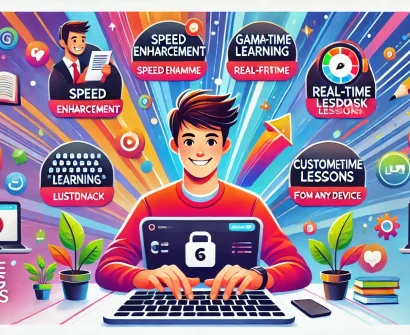The Importance of Effective Communication in Online Teaching: 5 Key Benefits

Effective communication is now essential to successful online education in the current digital era. The capacity to communicate knowledge in an understandable and interesting way is becoming increasingly crucial as instructors and educational institutions adjust to distant learning. This blog examines the benefits of Constructive communication and how it may change the way students learn in an online environment.
Reasons Why Effective Communication Is Important for Online Education
- Improves Student Engagement: Clear communication keeps students motivated and actively involved in lessons.
- Builds Stronger Relationships: Open dialogue fosters trust and a supportive learning environment.
- Enhances Understanding: Simplifies complex topics, making learning more accessible for all students.
- Reduces Misunderstandings: Clear instructions prevent confusion and help students stay on track.
- Encourages Collaboration: Promotes teamwork and peer learning through effective group discussions.
1.Make Sense and Comprehend
Establishing a stimulating and effective learning environment in online instruction requires constructive communication. Online instruction mostly uses virtual technologies and textual information, as opposed to traditional classroom settings where teachers can rely on nonverbal clues and in-person interactions. This shift highlights the critical need for effective communication to ensure that students can follow and engage with the course content effectively.
Making sure that pupils grasp the subject is one of the key functions of effective communication. Teachers need to be exact and explicit in their directions and explanations when they are teaching online. Ineffective communication can cause pupils to get upset or confused, which might impede their ability to learn. Clear and Constructive communication facilitates students‘ understanding of difficult subjects and allows them to stay on course
2.Participation and Exchange
Keeping students engaged is largely dependent on constructive communication. Although there are moments when learning online feels impersonal, teachers can bridge this gap with effective communication. Interactive aspects like live Q&A sessions, discussion forums, and feedback opportunities all depend on how well teachers communicate. Effective communication strategies make learning more participatory and enjoyable, inspiring students to engage actively in their education and fostering a dynamic online learning environment.For one to one support with Sir Kamran connect us on linkdin

3.Remarks and Enhancements
Constructive feedback skills are an important part of effective communication in online education. Students rely on comments to find areas for development and to measure their success. Effective communication ensures that feedback is clear, actionable, and encouraging. Hence, Constructive communication in feedback is essential for guiding students toward continuous improvement and academic growth
Techniques for Effective Communication in Online Education
Enhancing the online teaching experience may be achieved through the implementation of effective communication strategies. The following advice can assist instructors in improving their communication skills:
1. Speak Clearly and Briefly
Clarity is essential while instructing online. Steer clear of utilizing jargon or complicated terminology that might confuse pupils. Instead, describe things in plain and easy-to-understand terminology. This approach helps ensure that all students can simply follow along, regardless of their comprehension level. Effective communication using clear and concise language is critical for preventing misconceptions and enhancing the learning experience.
2. Use a variety of effective communication channels.
In order to effectively communicate with pupils, a variety of tools must be used. This includes using chat applications, video calls, discussion forums, and emails in an online environment. Every channel has a distinct function, such as sending out course materials or responding to specific inquiries. Effective communication across these various tools ensures that students receive consistent and comprehensive support.
3. Encourage a Supportive Effective Online Community
Effective communication requires the establishment of a supportive online community. Urge pupils to be honest with their opinions and to ask questions. Make sure kids feel comfortable asking for help by being friendly and responsive. Effective communication in this context helps build a positive online learning environment where students feel valued and supported.
4. Regularly Check for Understanding
Effective communication is not just presenting knowledge, but also ensuring that students understand what is being taught. Test comprehension on a regular basis using quizzes, polls, or fast feedback requests. Regular checks for understanding through constructive communication help address any gaps in knowledge promptly and effectively.

5. Offer Timely and Constructive Feedback
Timely feedback is a crucial component of effective communication in online education. Provide immediate feedback so that students may rectify any issues while the content is still fresh in their minds. Constructive communication in delivering feedback ensures that students receive the guidance they need to improve and succeed academically.
Conclusion
In conclusion, effective communication is critical to the success of online teaching. It assures clarity, keeps students engaged, and gives valuable feedback for growth. Educators may improve their online teaching efficacy by employing tactics such as utilizing plain language, combining numerous communication channels, creating a supportive environment, routinely checking for understanding, and offering prompt feedback. Constructive communication in all these aspects ensures a more effective and enriching online learning experience.
As online education advances, understanding the art of effective communication will remain a critical component in offering high-quality learning experiences. Understanding and applying constructive communication skills, whether as a teacher or a student, may have a substantial impact on the efficacy of online teaching and learning.
Constructive communication is not just a tool but a fundamental aspect of ensuring that online education meets its full potential






